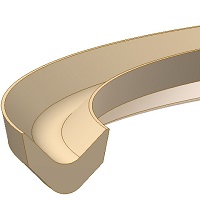V-Packing

- VALQUA No.
- 7330CV
- Product name
- Carbon Cloth and VALFLON V-Packing
- Shape
- VALFLON V-Packing

- Features1
- This is VALFLON V-Packing and used by laminating 3 layers or more.
- Features2
- Create a structure to constantly have the spring hold the packing at installation.
- Inventory status
- Manufacturable product
- Standard size
- Type
- Lip
- Application classification
- Common use
- Pressure classification
- Oil hydraulic
- Standard material
-
Usage location Material name Material No. Main part Carbon cloth and VALFLON - - Non-standard quality of material (adaptable material)
- Sealing direction
-
Flat surface Cylinder Cylindrical piston Cylindrical rod - - ○ ○ - Size
- Subject to design criteria



